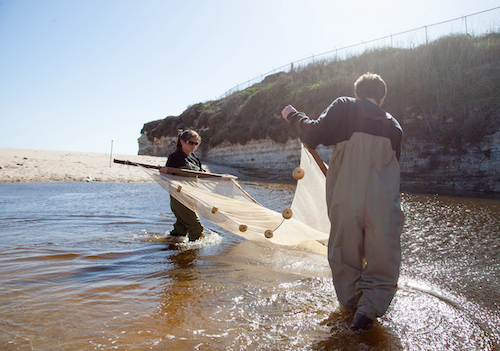UC Santa Cruz is ranked among the top 10 national public universities for excellence in undergraduate teaching, according to the latest rankings from U.S. News and World Report.
The only University of California campus on the list, the ranking recognizes the world-class education that UC Santa Cruz students receive and reflects the commitment from faculty and campus leaders to impactful educational innovations.
“Our values and commitment to student success guide our efforts and we take great pride in having our faculty recognized for their commitment to teaching and learning,” Chancellor Cynthia Larive said. “This reflects the university’s long standing focus on outstanding teaching, mentoring and experiential learning.”
UC Santa Cruz also ranked among the top public universities (No. 35), the best national universities (No. 83), and universities with the greatest social mobility (No. 18). UC Santa Cruz is also among the universities where students incur the least amount of debt as they work toward earning a degree.
Well known for computer science education and research, the UC Santa Cruz undergraduate program in Computer Game Design ranked No. 5 and the Computer Science program ranked No. 46.
Reflecting its work in creating a better world and commitment to sustainability, UC Santa Cruz was named the No. 2 university for public university in the nation for students focused on making an impact on the world and the No. 3 green college in the nation by Princeton Review.
A Hispanic-Serving research university centered on student success, UC Santa Cruz is on an unprecedented trajectory, with faculty pursuing research that is having a transformative impact on society while also playing a central role in the classroom experience, as students learn from those on the cutting edge of scholarship and knowledge creation.
UCSC is a member of the Association of American Universities (AAU) and the Association of Pacific Rim Universities (APRU), reflecting the quality of the campus’ research as well as graduate and undergraduate teaching. Earlier this year, UC Santa Cruz joined other leading universities to form the Alliance of Hispanic Serving Research Universities, a coalition of 21 research universities that aim to increase opportunity for those historically underserved by higher education. The campus also holds the distinction of being an Asian American and Native American Pacific Islander-Serving Institution.
The pairing of high-impact research with 10 vibrant and interdisciplinary residential colleges offers undergraduate students the experience of a small liberal arts college with the depth and rigor of a major research university.
"Our outstanding faculty is committed to advancing student success inside and outside the classroom," said Campus Provost and Executive Vice Chancellor Lori Kletzer. "We are increasing opportunities for undergraduates to join in research and creative scholarship earlier in their academic careers, learning what it means to create knowledge and gaining experience that contributes to academic and professional success."
UC Santa Cruz is focused on providing an unparalleled educational experience that supports students while they’re earning a degree and positions them for success when they graduate. The five-year Student Success Initiative, launched last year, has already raised more than $22 million to increase financial support for undergraduate and graduate students, and advance their access to the mentoring and experiences fundamental to their education and ultimately future success.
"UCSC provides students with incredible opportunities to become the next generation of leaders working to solve the world's biggest challenges and unanswered questions," Kletzer said.
The Student Success Initiative and UC Santa Cruz’s Center for Innovations in Teaching and Learning (CITL) have been key to elevating the undergraduate learning experience on campus.
CITL uses research and equity-minded practices to strengthen the culture of teaching, foster student success and equitable outcomes, and support teacher-leaders. Founded in 2016 to continue and refresh the university’s long tradition of educational innovation, CITL’s goal is to help educators and students thrive through use of the latest research and educational technologies.
The UC Santa Cruz campus community has been working to ensure that equity is at the forefront of its teaching and learning efforts. This has been central to CITL’s work, and includes everything from specific pedagogical approaches used in courses to working as partners with graduate students to offer opportunities for leadership and robust training for their important role in undergraduate courses and as future faculty. The work is just beginning, but the collaborative efforts are already driving towards improving student retention, persistence, academic achievement, and sense of belonging.
As part of a broad curriculum, CITL runs several faculty-geared programs that promote excellence in undergraduate teaching. The New Faculty Teaching Academy is designed for faculty in all fields, whether or not they are new to college-level teaching. This Academy introduces new faculty to UC Santa Cruz students and to the fundamentals of evidence-based teaching practices and course design and delivery that promote equitable outcomes.
Developed by CITL in partnership with the UC Santa Cruz HSI Initiatives team, Institutional Research, Assessment, & Policy Studies, and faculty innovators, Project REAL is designed to provide faculty with a research-based program to engage in comprehensive equity-minded course redesign to improve teaching and learning and contribute to equitable outcomes for students at UC Santa Cruz.
The Graduate Pedagogy Fellows Program recognizes the great power of graduate students as part of our course teaching teams and invites them in as peer leaders to implement evidence-based pedagogy across all departments on campus.
“UC Santa Cruz has, since its founding, had a special commitment to creating transformative learning experiences for undergraduates,” said Robin Dunkin, acting faculty director for CITL. “This recognition for undergraduate teaching is reflective of the sustained commitment to an equity first approach that faculty, graduate students, staff, and campus leadership have taken over the past decade to ensure every student has the opportunity to excel using the unique strengths and experience they bring with them from the diverse backgrounds from which they arrive.”
U.S. News and World Report looks at a variety of factors in its rankings, including retention and graduation rates, social mobility, faculty resources, and more.
This year, U.S. News and World Report ranked UC Santa Cruz:
- No. 5—Best Undergraduate Computer Science Specialty: Game Development
- No. 18—Social Mobility - National Universities
- No. 35—Top Public Schools - National Universities
- No. 36—Undergraduate Teaching - National Universities
- No. 46—Best Undergraduate Computer Science
- No. 51—Best Colleges for Veterans - National Universities
- No. 83—National Universities
- No. 87—Best Undergraduate Engineering - Doctorate
UC Santa Cruz is among the top 10 national public universities for excellence in undergraduate teaching. There were two ties in the top 10. UC Santa Cruz is ranked No. 7 or No. 9, depending on whether the subsequent rank after a tie is skipped or included.




